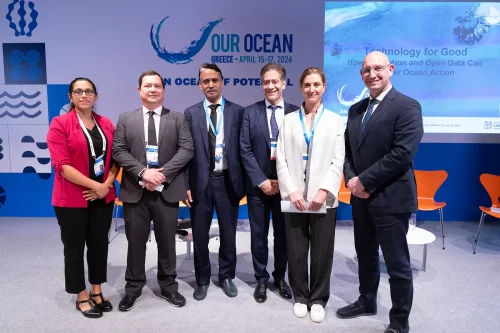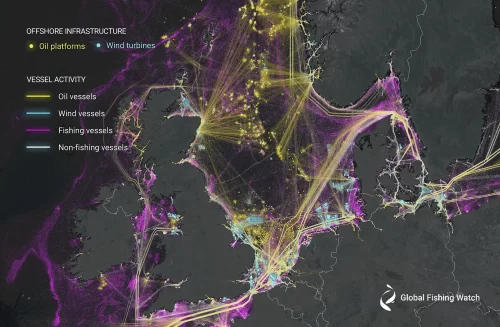Public interactive portal to help increase understanding and transparency of carrier vessels and their activities
Washington, D.C. — Global Fishing Watch launched a public web portal today that policymakers and fishery managers can use to better understand the activities of vessels that take on catch from commercial fishing vessels and deliver it to ports worldwide for processing. The Pew Charitable Trusts lent its expertise in fisheries to the development of the portal to guide its effectiveness and application.
The transfer of catch to carrier vessels, called transshipment, is a vital part of the global fishing industry. But it often takes place on the high seas, outside the view and reach of authorities, making it harder for them to verify that the amount and type of fish product transferred is lawful and sustainable.
The portal, hosted on Global Fishing Watch’s platform, will show users the breadth of transshipment activity worldwide to raise awareness among fish suppliers and consumers and improve the transparency of this practice.
“We are combining data from various sources and applying machine learning techniques in order to shine a light on what has, historically, been an opaque practice,” said Tony Long, CEO of Global Fishing Watch. “The public portal makes transshipment data easily accessible and will help bring much-needed transparency to global transshipment activities.”
Current monitoring and regulatory controls over transshipments at sea are inadequate, as there are few guarantees that all transfers are being reported and observed. This interactive, first-of-its-kind portal uses satellite technology, machine learning, and up-to-date vessel authorization databases to give users consolidated information on carrier vessels’ activities, allowing them to analyze vessel tracks and see which ports the vessels frequent. By using the portal, fishery managers can improve how they monitor and regulate this vital part of the seafood supply chain, helping to ensure the long-term sustainability of the fisheries they oversee.
“This portal will enable managers to verify transshipment activities, helping to reduce opportunities for unauthorized transfers of fish product and identify when such activity is not being adequately reported,” said Amanda Nickson, director of Pew’s international fisheries work.
The carrier vessel portal can give policymakers attending meetings of the five regional fisheries management organizations (RFMOs) a better understanding of transshipment activities in their respective waters. These RFMOs—which, combined, are responsible for managing fisheries in more than 90% of the world’s ocean—are the Indian Ocean Tuna Commission, the Inter-American Tropical Tuna Commission, the International Commission for the Conservation of Atlantic Tunas, the Commission for the Conservation of Southern Bluefin Tuna, and the Western and Central Pacific Fisheries Commission. With the portal, they can easily cross-check publicly available information with vessel monitoring system data and the national and observer reports they already receive.
“It’s time to change the way transshipment is managed,” said Nickson. “We hope this portal will give policymakers the additional information they need to reform this practice.”
For further information:
Kimberly Vosburgh, Senior Manager
Global Fishing Watch
[email protected]
Leah Weiser, Associate Manager
The Pew Charitable Trusts
[email protected]
Note to the Editor:
- The public web portal can be accessed at: https://globalfishingwatch.org/carrier-vessel-portal/
About The Pew Charitable Trusts and Global Fishing Watch
Global Fishing Watch and The Pew Charitable Trusts are working together to improve understanding and management of transshipment at sea through greater transparency, monitoring, and analysis of the activity. Global Fishing Watch will maintain the carrier vessel portal, and Pew will work to arm relevant authorities with the information and evidence needed to strengthen transparency and accelerate transshipment policy reform—particularly within the five global tuna regional fisheries management organizations (RFMOs). The shared ambition is to ensure that transshipment does not facilitate illegal fishing—and to instill confidence that transshipped catch is both legal and verifiable.
About the Gordon and Betty Moore Foundation
This project is funded by the Gordon and Betty Moore Foundation. The Gordon and Betty Moore Foundation fosters path-breaking scientific discovery, environmental conservation, patient care improvements and preservation of the special character of the Bay Area.

